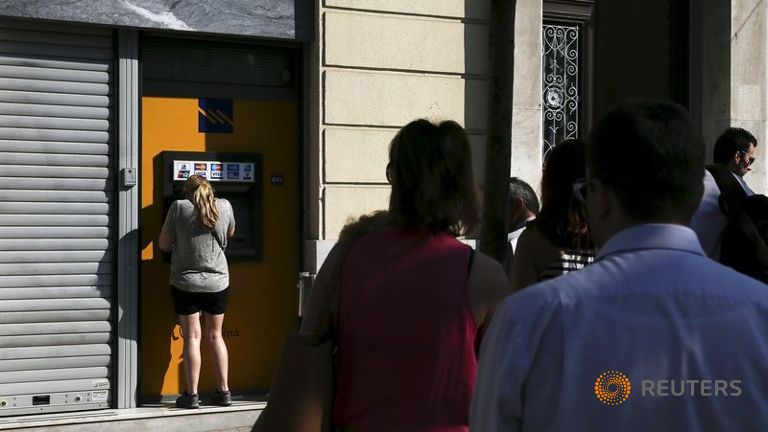Greece prepares to reopen banks, apply tax hikes
 |
| People line up at an ATM outside a closed Piraeus Bank branch, after the Greek government imposed capital controls at the country's banks in Athens, Greece Jun 30, 2015. (Photo source: REUTERS/Alkis Konstantinidis) |
ATHENS: Greece prepared on Sunday (Jul 19) to restart its struggling economy with a revamped government, a bank reboot and a new round of tax hikes agreed after months of fraught confrontation with its creditors.
Banks are set to reopen Monday after a three-week shutdown estimated to have cost the economy some €3.0 billion (US$3.3 billion) in market shortages and export disruption.
Crisis-hit Greeks will also have to endure widespread price hikes with a broad batch of goods and services - from sugar and cocoa to condoms, taxis and funerals - now taxed at 23 per cent, up from 13 per cent.
To sweeten the pill, the tax on medicines, books and newspapers falls from 6.5 per cent to 6.0 per cent.
With Greeks now able to withdraw up to €420 at once per week, people will be spared the ordeal of queuing daily at ATMs in the summer heat, which thousands did for three weeks for a mere allowance of 60 euros per day.
But capital controls remain largely in place, including a block on money transfers to foreign banks and a ban on the opening of new accounts.
Greece last week had to agree to a tough fiscal package to earn a three-year bailout from its international creditors and avoid crashing out of the eurozone.
For the first time in months, technical teams representing the creditors - the European Union, the European Central Bank and the International Monetary Fund - are expected in Athens next week to assess the state of the economy.
The austerity package caused a mutiny among lawmakers of the ruling radical Syriza party, forcing Prime Minister Alexis Tsipras to carry out a limited reshuffle on Friday.
Even so, most analysts and even government officials say early elections are now inevitable, and are likely to be held in September.
Tsipras - who barely has time to eat or sleep, according to his mother - faces a fresh challenge in parliament on Wednesday to approve a second wave of reforms tied to its economic rescue.
'CRASH TEST'
Pro-government newspaper Avgi on Sunday said the vote would be a "crash test" that could even result in the prime minister's resignation.
"If there are new losses, in whatever form, (Tsipras) will hand back his mandate," the daily said.
Tsipras' coalition holds 162 seats in parliament, but in last Wednesday's vote, only 123 government MPs backed the bailout - just over the minimum 120 required to sustain a minority government.
Nearly a quarter of Syriza's lawmakers - 39 out of 149 - failed to support the reforms bill, which passed thanks to solid support from opposition parties.
The leftist government has agreed to raise taxes, overhaul its ailing pension system and commit to privatisations it had previously opposed, in exchange for a bailout of up to €86 billion (US$94 billion) over the next three years.
The draconian agreement - accepted by a party that came to power in January promising to end austerity - came after over 61 per cent of Greeks on Jul 5 rejected further cuts in a referendum called by Tsipras himself.
The prime minister's critics accuse him of kowtowing to blackmail by Greece's creditors, who had threatened to expel the country from the euro.
"The commission is prepared for everything ... We have a Grexit scenario, prepared in detail," European Commission head Jean-Claude Juncker had warned on Jul 8.
The Kathimerini newspaper on Sunday said the "Grexit" plan, which also entailed Greece's expulsion from the Schengen Treaty, had been secretly prepared in less than a month by a 15-member European Commission team.
French Finance Minister Michel Sapin on Sunday insisted that the "real humiliation would have been for Greece to have been kicked out of the euro." "There was a real confidence problem ... now this confidence is being restored," Sapin told the To Vima weekly.
The Greek crisis exposed a rift between the eurozone's top powers, Germany and France, on how far to apply austerity to meet fiscal goals.
French President Francois Hollande on Sunday called for the euro's governance to be "strengthened", calling for "the addition of a specific budget and a parliament to ensure democratic control".
Commentators say the lack of centralised governance over national fiscal policies - a jealously-guarded sovereignty area for member governments - is a major flaw in the single European currency.
Greece is also scheduled Monday to repay €4.2 billion to the European Central Bank (ECB).
For this purpose, the EU on Friday approved a short-term loan of €7.16 billion, which will also enable Athens to repay debts to the International Monetary Fund outstanding since June.
What the stars mean:
★ Poor ★ ★ Promising ★★★ Good ★★★★ Very good ★★★★★ Exceptional
Latest News
More News
- Russian President congratulates Vietnamese Party leader during phone talks (January 25, 2026 | 09:58)
- Worldwide congratulations underscore confidence in Vietnam’s 14th Party Congress (January 23, 2026 | 09:02)
- Political parties, organisations, int’l friends send congratulations to 14th National Party Congress (January 22, 2026 | 09:33)
- 14th National Party Congress: Japanese media highlight Vietnam’s growth targets (January 21, 2026 | 09:46)
- 14th National Party Congress: Driving force for Vietnam to continue renewal, innovation, breakthroughs (January 21, 2026 | 09:42)
- Vietnam remains spiritual support for progressive forces: Colombian party leader (January 21, 2026 | 08:00)
- Int'l media provides large coverage of 14th National Party Congress's first working day (January 20, 2026 | 09:09)
- Vietnamese firms win top honours at ASEAN Digital Awards (January 16, 2026 | 16:45)
- ASEAN Digital Ministers' Meeting opens in Hanoi (January 15, 2026 | 15:33)
- ASEAN economies move up the global chip value chain (December 09, 2025 | 13:32)
















 Mobile Version
Mobile Version